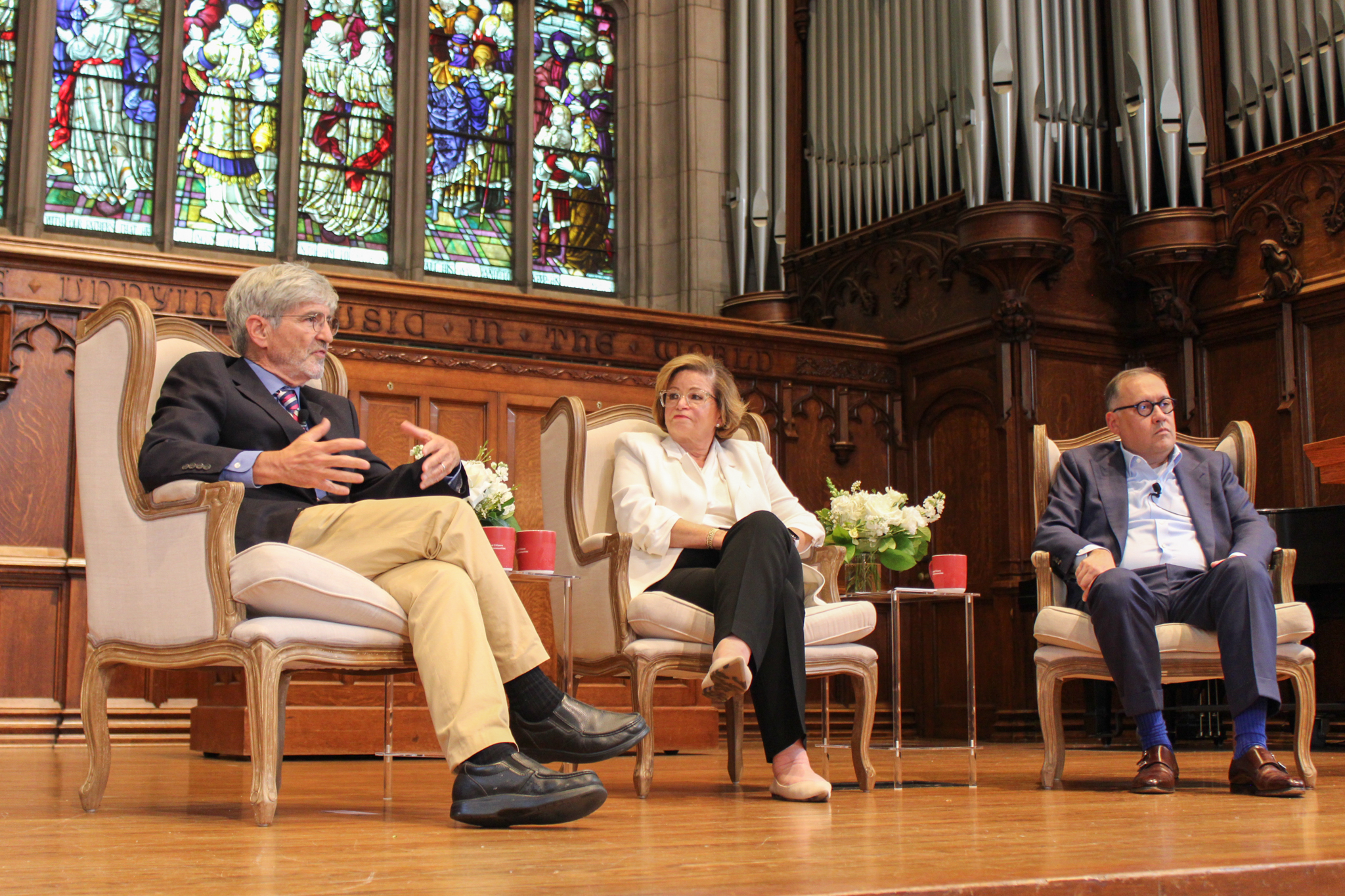News
“Disagree without being disagreeable:” Chancellor Martin hosts panel on free speech, protest, and democracy

(Rachel Benitez | Student Life)
Chancellor Andrew Martin met with Valerie Jarrett, CEO of the Obama Foundation, and Washington Post reporter Michael Isikoff to discuss free speech and democracy on college campuses on Sept. 9.
This event was a part of the Chancellor’s Fireside Chat series, hosted by the Gephardt Institute for Civic and Community Engagement, with community members, faculty, and students alike filling the majority of Graham Chapel.
Martin, Jarrett, and Isikoff discussed making change through activism versus democratic systems, comparing protests on college campuses during the Vietnam War to now during the Israel-Hamas War.
Isikoff and Jarrett emphasized the importance of free speech and hearing different perspectives on college campuses.
“The arc of change takes time — and you’re so impatient, just as I was, because we wanted that divestiture to happen right then and there, and it didn’t,” Jarrett said. “We have to figure out a way, in a richly diverse, complicated country, how to disagree without being disagreeable, how to be curious and active listeners, how to give yourself the grace to change your mind.”
Isikoff, who attended WashU during the Vietnam War, said he believes that civil disobedience does have its place in making change.
“Civil disobedience means the protesters accept the consequences,” Isikioff said. “[Look] back to the civil rights movement. That’s what the leaders of the civil rights movement did. They were making a point by doing that. I draw the line [when] protesters break the rules and say, ‘no, there shouldn’t be consequences.’”
However, Isikoff said that the consequences of protesting should be within reason. When asked about a professor who was reportedly injured while being arrested on April 27, he said that law enforcement officers should also be subject to similar scrutiny.
He explained that he takes issue with both protestors and law enforcement officers who do not accepting consequences for their actions, specifically in response to the professor whose ribs were broken.
“If law enforcement steps out of bounds, they need to suffer the consequences too. It shouldn’t be that complicated,” he said.
This fireside chat took place after a year of heightened tensions regarding the Israel-Hamas War on university campuses across the United States, including WashU. Just last semester, 26 students were arrested at two different on-campus protests.
Security was tight at this event, including at least two officers from the Washington University Police Department (WUPD), an ambulance on standby, and two private security guards, which may be a response to the protest that broke out at the last free speech event hosted by the chancellor.
“One of the things we are seeing is that many [young people] are willing to abandon democracy for other forms of governance, such as autocracy in particular,” Martin said.
Jarrett encouraged young people to get involved in the democratic process.
“If you’re unhappy with democracy, the responsibility is on you to make it better,” Jarrett said. “It is in your hands to strengthen institutions.”
WashU sophomore Isaac Trommer was inspired to get more involved in the democratic process after attending the panel.
“They touched on how the way to solve your disillusionment is through democratic involvement,” Trommer said. “[This event] got me excited about this election cycle and kind of how important it is. It made me want to go to more of these events.”
Jarret spoke about a protest she attended during her college years, and feeling a “sense of empowerment” as she marched on campus protesting against Stanford’s investments in South Africa, a country that embraced apartheid at the time.
Isikoff, a WashU graduate, found his passion for democracy while sitting in Graham Chapel at similar events.
“It was my experience at Washington University that gave me an appreciation for the democratic process,” Isikoff said. “There was nothing I enjoyed more during my time at WashU than being able to hear from people across the political, philosophical, and ideological spectrum.”
Isikoff went on to say the main issue on college campuses today is the inability to hear others’ perspectives on controversial issues.
During Isikoff’s time at WashU, students were protesting for divestment from the McDonnell Aviation Corp., run by WashU board member James McDonnell. At the time, McDonnell was supplying aircrafts to Vietnam. McDonnell was later acquired by Boeing.
“I wrote an editorial for Student Life saying expelling James McDonnell will not have any impact on the Vietnam war at all,” Isikoff said. “If you really want to have change in this country, if you really want to participate in a way that you have your voice heard, why don’t you go work for [anti-war presidential candidates]?”
Students succeeded in getting McDonnell off the board and divesting from his company. Isikoff drew parallels between this and student calls for the University to cut ties from Boeing.
For Caleb Cohen, a WashU senior studying political science, the event encouraged him to become more active in the democratic process with voting and elections.
“[My] biggest takeaway is that I feel inspired to go vote and help fix the world a little bit more,” Cohen said. “They didn’t say anything controversial or anything that would rile up the room…they very thoughtfully said that if you believe in something, go say something about it.”
For Isikoff, the key issue on college campuses is the inability to engage with ideas different from our own.
“I think equally dangerous to democracy is what I see happening on university campuses across the country, which is a refusal to listen to people who have different points of view,” Isikoff said. “Free speech should make you feel uncomfortable, presenting you with ideas that you hadn’t thought of or challenging your preconceptions.”
